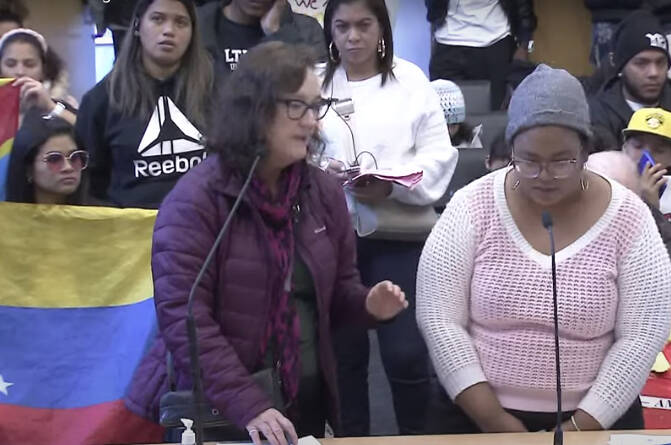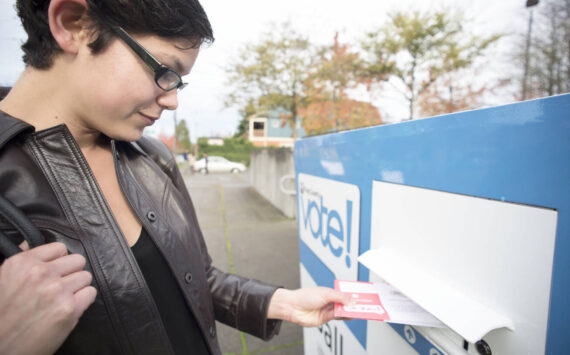Seattle city leaders agreed to fund a one-week extension for Venezuelan migrants staying at a Kent hotel after several of the refugees testified at a Seattle City Council meeting asking for help to avoid eviction.
Eli Min, who along with his family have owned the Quality Inn at 1711 W. Meeker St. since May 2022, said earlier in the week that he needed payment from somebody in order for the nearly 160 migrants from 90 families to remain at the hotel past this week.
As of Friday, Feb. 2 the migrants remained at the hotel after a reprieve from the city of Seattle, although Min said he had yet to receive the funds or a contract.
“I’m in communication with them,” Min said in a Feb. 2 phone interview about Seattle city officials.
Min said the anxiety of the situation has caused him to limit what he says to the media.
“I’m trying to tread carefully,” he said.
Jamie Housen, a spokesperson for Seattle Mayor Bruce Harrell, said in a Feb. 2 email to the Kent Reporter that the city will pay the hotel.
“Earlier this week, Mayor Harrell’s office and the Office of Immigrant and Refugee Affairs announced to migrants facing eviction that the city will fund a one-week extension of their stay in Kent as we work with King County, the state of Washington, and other regional partners to find a more appropriate and sustainable solution to address the impacts of this humanitarian crisis,” Housen said.
Housen declined to specify how much the city will pay the hotel, but said the Seattle City Council allocated $200,000 to the Office of Immigrant and Refugee Affairs in anticipation of issues facing migrants and refugees, and “we expect to spend dollars out of that appropriation.”
Pat Fitzpatrick, city of Kent chief administrative officer, said in an email earlier this week that the city did not have the resources to remove and relocate individuals and viewed the issue as a matter between the hotel and the nonprofit that brought the people to the hotel.
Although not on the agenda of the Jan. 30 Seattle City Council meeting, Council President Sara Nelson allowed the migrants to speak because they had come from out of town to talk about the possible eviction from the Kent hotel.
Several migrants testified (with help from a Spanish translator) that they needed help, which is why they traveled to Seattle from Kent.
“I’m asking for help because we might possibly get (back) there and have no place to stay,” one mother said. “We ask you to take into consideration to help us with some kind of a solution. …families are there. …we need help with attorneys for asylum so we can get a job and pay our bills.”
Hamdi Mohamed, Seattle’s Office of Immigrant and Refugee Affairs director, spoke at the meeting that the city is trying to help with migrant issues.
“I sympathize with a lot of people in the room,” Mohamed said. “I came here as a 3-year-old from Somalia. My
office has been working with the state tracking migrants into the state for two years. The influx we are seeing in the state we are seeing across the entire country.”
The Venezuelan migrants traveled to the United States to seek asylum. They emigrated due to ongoing economic and political turmoil, according to the United Nations Refugee Agency.
“It’s a federal and international manner,” Mohamed said. “We look to the federal government for support, but we are not seeing that, so localities take it on with their own resources.”
Mohamed said the city has worked with the state, King County and the city of Tukwila tackling the issue for many months.
The migrants, who ended up in Kent, were at the Riverton United Methodist Church in Tukwila, but when that church became overwhelmed with too many refugees to house in tents or inside the church, a nonprofit group called Save the Kids led them to the hotel.
Mohamed said the county allocated $3 million to house refugees at hotels, but prioritized families with young children and people who are pregnant. She said the state Office of Refugee and Immigrant Assistance and the state Department of Commerce could have additional funds but that money will not be available this year until the Legislature passes its budget.
“We are trying to come up with a regional plan,” Mohamed said. “We connect migrants with employment authorization cards so they can work and move out of hotels into homes.”
She said the city also works with nonprofits to help find answers through additional resources.
“It is a very difficult situation,” Mohamed said. “Everyone should have some type of access to shelter.”
Seattle City Councilmember Tammy Morales thanked the migrants for coming to the meeting. She said she helps oversee the city’s Office of Emergency Management and that she expected the city would be able to come up with temporary funds to help them with housing.
Maurece Graham-Bey, listed on the nonprofit savethekidsgroup.org website as the national director of critical reintegration services, told the Kent Reporter in a Jan. 31 phone interview that his group is still trying to help find housing for the migrants.
Graham-Bey worked with the Quality Inn to initially bring the refugees to the hotel in early January from the Tukwila church. He said they planned to help about 25 people relocate but that more and more people kept coming.
“There was a huge amount of people,” Graham-Bey said. “We had a target of 25 people from four families and it was vastly different from what we had organized.”
He said his group doesn’t have funds to pay for hotels but tries to arrange for other groups or private individuals to cover the costs.
Graham-Bey said the refugees ended up in Washington because it is one of the states that support immigrants. He said some people who cross the border in Texas are put on buses to Democratic cities. He said the Venezuelans have applied for asylum but it can take months or even years before they can get into court for approval.
“They want an opportunity to work,” Graham-Bey said, which means they could pay for housing. “The Venezuelans are a more professional class of immigrants. Other than not speaking English, they are work ready if they had a work permit.”
He said they are a multi-talented group and could do numerous jobs, including social work, medical work, mechanics and construction.
As far as what might happen next, Graham-Bey remained confident housing and jobs will be found.
“We’ll get some good outcomes,” he said.








